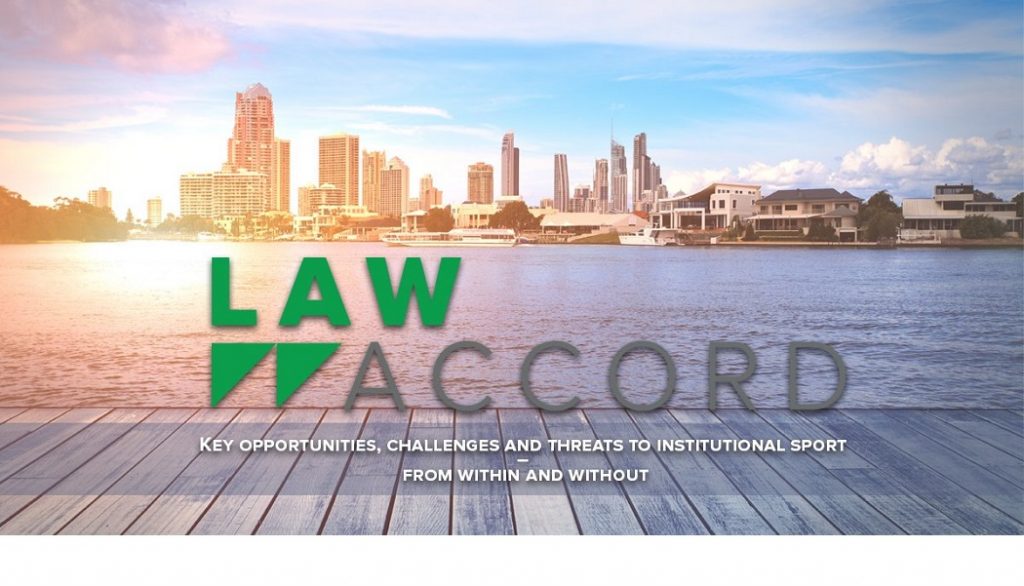LawAccord Experts Tackle Wide Range Of Topics
May 7, 2019
LawAccord stepped up to present its first full-day session with a near-capacity audience, a high-calibre collection of expert speakers and a ringing endorsement from SportAccord Acting-President Francesco Ricci Bitti.
The SportAccord Daily reports:
Ricci Bitti congratulated LawAccord on its expansion and paid tribute to an initiative that “has been a pioneer in the SportAccord organisation.”
He added: “We are in difficult times. On the positive side sport is more relevant in society than in the past, but the negative side is that it’s more complex and that means we need more lawyers. Legal expertise is one of the skills that has been handed to all sports organisations to solve a variety of problems on the professional side and in the grassroots. The people working in law are important partners in sport today.”
The agenda addressed a variety of the legal issues affecting sport in a range of formats, with doping, match-fixing and rival leagues among the topics tackled.
First up was Malcolm Speed AO, former CEO of the International Cricket Council and Cricket Australia, with a Keynote Address on whether great governance is possible.
He said that great governance should be illustrated by a “thriving organisation where the board adds value to the sport”. Speed added: “We have very critical and demanding constituencies. Good governance has made a positive difference, but the time has come for us to move to the next level and achieve great governance.”
Governance was just one of the issues highlighted by Matthieu Reeb, Secretary General of the Court of Arbitration for Sport (CAS).
Reeb provided an update on recent developments, concluding with the Caster Semenya case, which he described as “difficult, not only because it is beyond the law”. He added: “We have different opinions expressed; legal opinions, scientific opinions. It may not be the end of the story, because there is still the possibility of appeal.”
Most of the cases listed by Reeb involve doping, which was addressed in more detail by Brent Nowicki, Managing Council and Head of the Anti-Doping Division at CAS.
Nowicki explained how the division had evolved from a service at the 2016 Olympics which he admitted was “not very efficient” to an improved system at the 2018 Winter Olympics and now a permanent part of CAS. He said the goal is to provide a service which is “time-sensitive and cost-sensitive”, and above all independent.
He said: “It must physically be independent and we pride ourselves on being that independent authority so that decisions are made by individuals not appointed by the IFs, not paid by the IFs and not associated with the IFs in any respect.”
World Anti-Doping Agency President Sir Craig Reedie then offered his latest opinion on the most high-profile doping episode of recent years. He insisted that the situation in Russia has “moved on a long way”.
He added: “We should stick with that, get it finished and move on.”
Catherine Ordway, Assistant Professor and Course Convenor in Sports Management at the University of Canberra and a Senior Consultant in Sports Law at Snedden Hall & Gallop Lawyers, was joined by Iain Roy, Managing Director of Royglo Pty and Founding Head of Integrity at Cricket Australia, in a one-on-one discussion about match-fixing. They described the “gamblification” by certain organisations that circumvent regulations by streaming events to overseas territories and enabling betting markets on low-level competitions.
Matthew Mitten, Professor of Law and Executive Director of the National Sports Law Institute at Marquette University Law School, also discussed the issue of rival leagues and competitions. He said EU law provides no immunity for IFs that act in ways that could be considered to be anti-competitive for the economic interests of athletes.
However, he added that IFs would be acting lawfully if they were to pursue legitimate objectives, such as countering activity from a rival league by launching a new competition.


